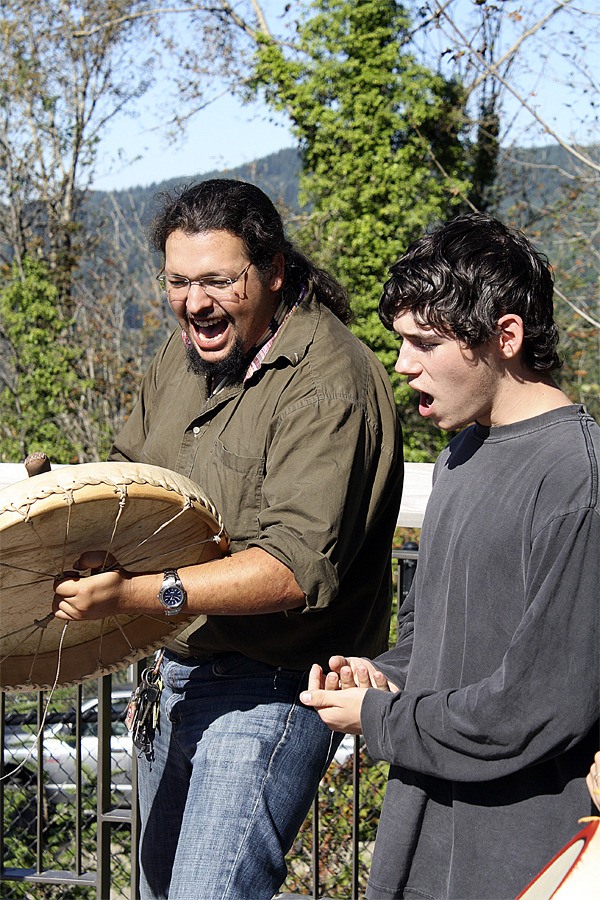The group of young Snoqualmie Tribe drummers’ song of celebration turned solemn when the trees began to fall.
Kissed by a misty breeze from Snoqualmie Falls, the tribal drummers gathered Wednesday, Oct. 6, at the cataract to mark the 11th anniversary of federal recognition of the tribe.
“We’re getting back in touch with the things we need to do,” said tribal singer Jessy Lucas.
Beginning the rites, Lucas purified drums with smoke from sacred sage, then led the gathering with songs, old and new.
Snoqualmie Falls was an appropriate place to make the culmination of the decades-long fight for official tribal status.
“This is our creation place,” said Lois Sweet-Dorman, a Snoqualmie. “The connection here is real and deep.”
The gathering’s smiles fell when chainsaws started to rip in a nearby glade. The Snoqualmie Falls Park is getting remade as part of Puget Sound Energy’s relicensing project. But to many Snoqualmies, the falling firs touched a terrible chord.
As tribal members cried or chanted quietly, Lucas and his drummers ceased their Mountain Honor song and, with lowered eyes, lifted their hands to the sky.
“It hurt to be singing an honor song while hearing part of my mountain being sawn down,” drummer Dalenna Johnson said afterward. “Every time a tree goes down to create a better eyesore, it really hurts.”
“The tears aren’t just for sadness,” Lucas said. “They’re also for healing. These things help keep us going, help keep the people strong.”
Recognition day
Change is a constant even for a culture that traces its roots back millennia. Today’s Snoqualmie Tribe, with its casino business venture, seven-acre reservation and social programs, would not exist without the federal status that changed on Oct. 7, 1999.
“This is an important day for all Native Americans,” Tribal Chairwoman Shelly Burch told the gathering.
All tribal offices were closed, and employees took the day off as a time for reflection.
“Tribal culture has been alive for millennia, but many of the programs and services we are able to offer would not be possible without recognition,” Tribal Administrator Matt Mattson said.
The tribe’s struggle for recognition stretches back 150 years. The tribe was a signatory to the 1855 Point Elliott Treaty, but the following years saw some Snoqualmies move to the Tulalip Reservation. Many stayed behind, however, and continued to lobby the government for their own reservation. A Tribal Council was formed in 1914, and in the 1930s, the federal government worked on plans to give the Tribe its own 10,000-acre reservation near Tolt.
In 1953, the federal government said the Snoqualmies could no longer be recognized as a tribe because they had no land to call their own. The Snoqualmies of the Valley continued to lobby the federal government, though, for recognition, land and fishing rights.
Official recognition came in 1997, but the ruling went through two years of appeals by the Tulalip Tribe before it was finalized.
Looking ahead
In spite of past and present challenges, Burch sees a bright future for the Snoqualmie people.
The tribe opened its casino at the start of a global recession, but the gaming venture has been holding its own, she said.
The death of tribal elder Earl Moses postponed a long-awaited general membership meeting on Sept. 25. The meeting was held informally as an informational session. The general membership meeting is now set for Nov. 13 at the Monroe fairgrounds longhouse.
Burch is pursuing economic and educational growth.
“A lot of kids have graduated from college and come back to the tribe for jobs,” she said. “That’s what we’re looking for.”
The tribe plans a departmental fair for members, and Burch is pushing for health insurance for all members in the 2011 budget.
“I see everything good for this tribe, moving forward,” Burch said. “It’s one step at a time, but we’re going forward.”



